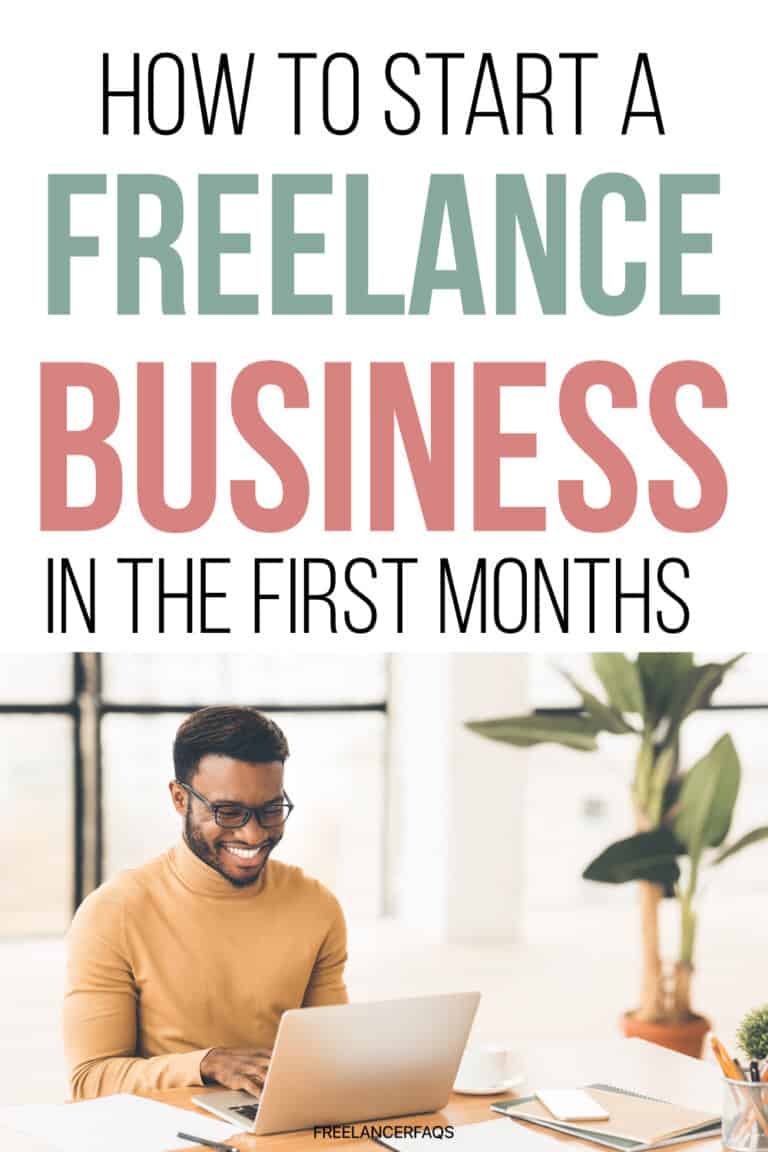So, want to know how to start a freelance business?
That’s amazing!

Starting a freelance business involves some tedious work at the beginning.
No matter the circumstances that led to your decision, maybe you want the freedom of creating your own schedule and working with a dream client.
But, where to start?
First, you need to realize that you made the decision to be self-employed.
As such, you need to treat your business, well…as a business.
Before you even start to reach out to prospective clients, you need a plan. A business plan.
Creating your business involves some tedious work at the beginning.
But this tedious work will set the tone as you embark on your freelance business and avoid risks.
You will need to make a plan, make financial decisions, and take some legal actions.
Here are the steps to help set start a freelance business operations during your first months as a freelancer.
Write your Business Plan
I fear many freelancers skip this step of the process of becoming a freelancer but writing a business plan will provide you with the steps you need to be successful.
It will also make business operations tasks easier to complete as your business plan will work as a road map to get you where you want to go.
To help you out, Elna Cain has a wonderful business plan you can use for free!
Don’t overwhelm yourself as you get started.
Start easy and decide what to name your business (if different from your own) and draft your mission for your business.
What is it you want to do? Who do you want to help? How will you help them?
Remember, a mission will need to be separate from your personal goals as a freelancer.
It will be all about your dream client and what you will do to help them.
It will lead you to determine the products or services you will offer.
For example, as a freelancer, I provide clients with two services: writing and photography. Find out how you can help your clients to create your services.
For writers, maybe it means providing blog posts, ghostwriting, or copywriting services.
You can take this step further and decide on the industry you want to specialize.
Maybe it is the wellness and fitness industry, education, or cannabis, or travel and hospitality.
This is the best part. You get to choose what you want.
Then, there’s marketing.
As freelancers, the best way to find potential clients will be through social media and your portfolio.
Find out which social media platform your dream client uses and get on there.
LinkedIn should take priority as it will serve as a resume.
You can also feature your portfolio in your profile. Others include Twitter, Facebook, Instagram, and Tik Tok, to name a few.
Lastly, create your financial goals and budget.
A simple homemade spreadsheet can help you keep track of income and expenses.
It will make it easier during tax season.
Take this opportunity to also set your freelance rates for the different services you wish to offer.
Choose a Business Entity

As part of your business plan, start thinking of your business as an entity when you learn how to start a freelance business.
According to the Cambridge dictionary, an entity is “something that exists apart from other things, having its own independent existence.”
However, not all business entities are equal as these have their upsides and downsides.
Choosing the right business entity can make or break your freelance business.
Types of Business Entities
Sole Proprietorship
When learning how to start a freelance business often means understanding the types of business entitites.
A sole proprietorship entity is simply a business run by just one individual.
It is also the simplest way to create a business as it doesn’t require any legal action.
If you decide today that you want to be a freelancer, then you’re officially a sole proprietor. You can start working right away.
You may think, “I thought an entity needed to have its own independent existence.”
You’re right, there won’t be any difference between you and its business existence.
The main difference will come from an accounting perspective as your business financial liabilities will be linked with your personal financial liabilities.
Partnership-General and Limited
 The name of this business entity is exactly what it is, a partnership.
The name of this business entity is exactly what it is, a partnership.
A general partnership will be between two or more people with a specific (expressed or implied) agreement between the people.
There are legal steps to form a general partnership, such as filing a certificate with state authorities.
There will also be a separation between any business financial liabilities against personal ones.
Limited Liability Company (LLC)
You may think an LLC is one of those big tech companies in existence.
You’re not wrong. Think of the LLC as a hybrid between a partnership and a corporation. You have some of the advantages of a partnership while having limited liability.
There are also many legal steps to forming an LLC.
It requires an operating agreement, filing your LLC with your state, obtaining an EIN, and opening business bank accounts.
You may think this business entity won’t work for you, but you have the option to create a single-member LLC, which is a limited liability company with only one individual.
It provides certain flexibilities as you have the option to get taxed as a sole proprietorship or as a corporation.
A single-member LLC will also protect your personal assets, unlike a sole proprietorship, as there is a true legal separation between you as an owner and the business itself.
Corporation | S-Corporation
A corporation operates under state law and provides protection to stockholders from liabilities.
It also faces government regulations, but personal assets are protected.
A corporation can also be inherited, so it can continue even after its founders are long gone.
Business Registration and the IRS
When you start a freelance business, which entity do you choose?
If you’re just getting started, you can proceed as a sole proprietor.
This is what I did.
There are some financial liabilities risks, but you can separate your business earnings from your personal assets by setting up some protection in place.
As a sole proprietor, you can apply for an employer identification number (EIN) with the IRS.
The process is simple, free, and it can be done online.
You can use your EIN for invoicing purposes and to open separate business bank accounts.
As your freelance business grows along with your earnings, then you can set up further protection by creating a single-member LLC.
It will give you the protection you need against any potential personal liabilities and gives your flexibility at tax time.
There are some steps to forming a single-member LLC.
First, you need to ensure your freelance business name is available as no two LLCs can have the same name. Simply type in your search engine “[State] LLC search” to do an entity name search with your state.
You will also need to prepare articles of organization and an LLC operating agreement, which can vary depending on the state where you will register.
Templates are available online, but another option is to move forward with a registered agent.
Finally, you submit the articles of organization and the filing fee with the state.
Note that you will require a new EIN for your newly single-member LLC and lastly, open up new business bank accounts.
It would be best to speak with a tax advisor to learn more about your tax responsibilities, such as paying quarterly and annual taxes as a sole proprietor and later on as a single-member LLC entity.
Open Business Bank Accounts & Monthly Budget

You will need to learn a little bit about booking as a freelancer.
When I first started as a sole proprietor, I had the option to open a business bank account as a DBA, or “doing business as.”
You will need to provide your social security number or a Tax ID Number, and the name of your business (if different from your own).
The purpose of the account is to separate any income received from clients from personal finances. At the same time, it will be the account you use for any expenses incurred for your freelance business.
It’s easier to keep track of your business finances when they are separate from your personal ones.
You will also be better aware of your monthly budget.
You can separate your income by the client or the services you provide.
For example, I keep track of my income based on recurring client work, paid blog posts, and any special one-time assignments.
For expenses, you may have some fixed or variable expenses.
Fixed expenses include any monthly subscriptions, and Bluehost/WordPress while variable expenses may include internet usage, continued education, or any other type of expense to improve or run your business.
You can start with a simple spreadsheet to keep track of your income and expenses.
Once your business is off the ground and earnings are more consistent, you can sign up to use a software tool, such as QuickBooks Self-Employed (which can be convenient during tax season).
Takeaway
A freelance business is more than just creating content and honing your skills to deliver it.
There are business operations in the backend, so you will wear many hats as you undertake your freelance career.
Set yourself for success by drafting a business plan to guide you, choose a business entity to separate yourself as the owner from the business, register your business and have a clear understanding of how your taxes will be affected, open a business bank account, and keep track of your finances.
Are there any other steps you took to create your freelance business?
Let me know in the comments!
Disclaimer: The information contained within this blog post is for informational purposes only and is not intended as a substitute for obtaining legal or tax advice from a professional in the field as it pertains to your specific freelance business. Please consult a professional if expert assistance is required.



Leave a Reply